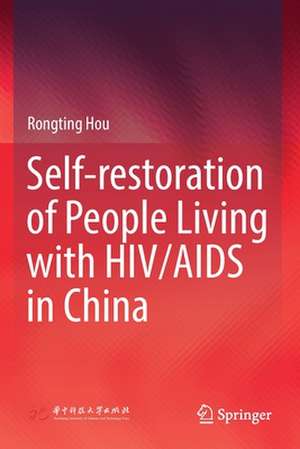Self-restoration of People Living with HIV/AIDS in China
Autor Rongting Hou Traducere de Hulin Zhaoen Limba Engleză Paperback – 28 oct 2021
The book’s three most important features are as follows: 1) its application of self-psychology by Heinz Kohut into the context of psychological intervention; 2) a wealth of qualitative data gathered through in-depth interviews; and 3) the author’s self-reflection and analysis. The book offers a valuable guide for graduate students, researchers, and policymakers alike.
By interviewing selected individuals at a given organization, the book focuses on the life histories of selected individuals after being diagnosed with AIDS (screening HIV positive) and on corresponding interventional mechanisms. Further, itemploys the self and self-object as key explanatory terms for the necessary psychotherapeutic interventions,and in order to create guidelines that sufficiently reflect the illness and corresponding interventions. Given its scope and focus, the book offers a valuable guide for graduate students, researchers, and policymakers alike.
| Toate formatele și edițiile | Preț | Express |
|---|---|---|
| Paperback (1) | 635.01 lei 6-8 săpt. | |
| Springer Nature Singapore – 28 oct 2021 | 635.01 lei 6-8 săpt. | |
| Hardback (1) | 641.20 lei 6-8 săpt. | |
| Springer Nature Singapore – 28 oct 2020 | 641.20 lei 6-8 săpt. |
Preț: 635.01 lei
Preț vechi: 747.06 lei
-15% Nou
Puncte Express: 953
Preț estimativ în valută:
121.51€ • 127.29$ • 100.70£
121.51€ • 127.29$ • 100.70£
Carte tipărită la comandă
Livrare economică 09-23 aprilie
Preluare comenzi: 021 569.72.76
Specificații
ISBN-13: 9789811574153
ISBN-10: 9811574154
Ilustrații: XI, 172 p. 1 illus.
Dimensiuni: 155 x 235 mm
Greutate: 0.27 kg
Ediția:1st ed. 2020
Editura: Springer Nature Singapore
Colecția Springer
Locul publicării:Singapore, Singapore
ISBN-10: 9811574154
Ilustrații: XI, 172 p. 1 illus.
Dimensiuni: 155 x 235 mm
Greutate: 0.27 kg
Ediția:1st ed. 2020
Editura: Springer Nature Singapore
Colecția Springer
Locul publicării:Singapore, Singapore
Cuprins
Chapter 1 Introduction.- Chapter 2 Combating AIDS in China.- Chapter 3 Way to Relation Construction and Deepening: Relational Psychoanalysis.- Chapter 4 From No Road to Take to a Difference Made: A Life-Affecting-Life Journey.- Chapter 5 Crossing the River by Feeling for the Stones: A Love-Infecting-Love Exploration.- Chapter 6 Gaining Time: Self-reconstruction in Joint Relation Construction.- Chapter 7 A Further Exploration of Self-reconstruction and Intervention.- Bibliography.- Afterword.
Notă biografică
Rongting Hou obtained his Ph.D degree in Psychology from Fu Jen Catholic University in 2015 and in Sociology from Renmin University of China in 2016. Currently a Master Supervisor at Inner Mongolia University of Science and Technology, he is interested in the sociology of sex, psychoanalysis, sociological and social work related to drug use and AIDS. He participated in the key project of the 11th National Five-year Plan on Science and Technology “A Research on Epidemic Law, Epidemic Assessment and Precaution Measures” and, as head of the survey team, in the International Labor Office (ILO) project “A Quantitative Survey of AIDS Epidemic Trends and Behavioral Interventions”.
Textul de pe ultima copertă
This book adopts an approach based on relational psychoanalysis, developed in the USA in and since the 1990s and guided by the self-psychology championed by Kohut and the Post-Kohutians. How people infected with HIV/AIDS live their lives is a growing concern in China. The book, based on relational psychoanalysis, explores their self-restoration, and more specifically, how adopting an attitude of “dying to live” helps them face tremendous challenges in life. By interviewing selected individuals at a given organization, the author focuses on their life experiences and on corresponding interventional mechanisms.
The book’s three most important features are as follows: 1) its application of self-psychology by Heinz Kohut into the context of psychological intervention; 2) a wealth of qualitative data gathered through in-depth interviews; and 3) the author’s self-reflection and analysis. The book offers a valuable guide for graduate students, researchers, and policymakers alike.
The book’s three most important features are as follows: 1) its application of self-psychology by Heinz Kohut into the context of psychological intervention; 2) a wealth of qualitative data gathered through in-depth interviews; and 3) the author’s self-reflection and analysis. The book offers a valuable guide for graduate students, researchers, and policymakers alike.
By interviewing selected individuals at a given organization, the book focuses on the life histories of selected individuals after being diagnosed with AIDS (screening HIV positive) and on corresponding interventional mechanisms. Further, itemploys the self and self-object as key explanatory terms for the necessary psychotherapeutic interventions,and in order to create guidelines that sufficiently reflect the illness and corresponding interventions. Given its scope and focus, the book offers a valuable guide for graduate students, researchers, and policymakers alike.
Caracteristici
Creates guidelines that sufficiently reflect the illness and corresponding interventions Presents a quantitative study and focuses on the life histories of selected individuals after being diagnosed with AIDS, as well as corresponding interventional mechanisms Proposes a “Dying to Live” model for the self-restoration of infected persons, related interventional mechanisms, and a model that incorporates a range of spatial and temporal dimensions?
